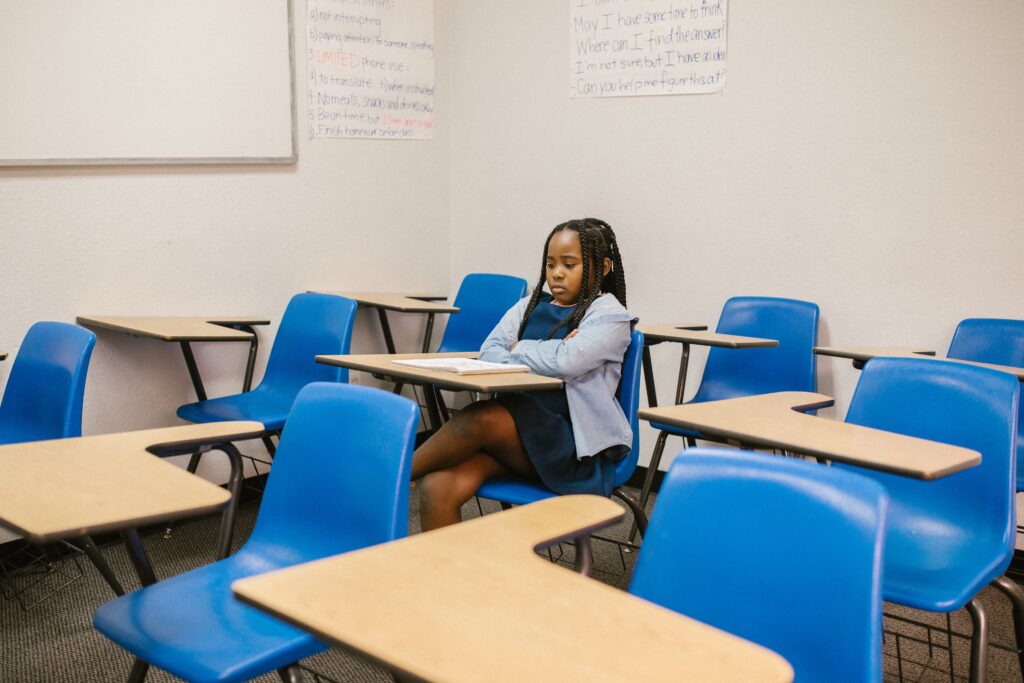Depression is often mistaken for Low mood but which is which? Feeling sad, fed up, demotivated, and low is normal, and we all experience it. That’s all part of being human. Terms ‘Depressed’ and ‘Low mood’ are often used interchangeably but have different meanings, although symptoms may be similar.
So what’s the difference?
Depression often brings about hopelessness and anhedonia (loss of interest and pleasure). And the prevalent feelings of doom. So the contrast between the two is the intensity and duration of the feeling. The low mood will tend to lift a few days or weeks after making minor changes in your life. For example, resolving a problematic situation, discussing your problems, or getting more sleep or exercise can improve your mood. A low mood that doesn’t go away can signify depression. For black students, the increased stress of racism (microaggressions), stigma (from their family and friends), financial worries, and the pressure to excel put them at higher risk for mental illness. If the symptoms are not managed, they can affect academic performance and social experience.
Depression in black students may manifest differently compared to other groups;
Symptoms in men: Chronic pain and digestive issues can be related to depression. Loss of focus (ability to process information slowed down), anger, substance misuse. Also, sexual dysfunction, suicidal thoughts, poor concentration, low self-esteem, and loss of interest in pleasure in life. In some, there are feelings of guilt and worthlessness, among many other symptoms. Some symptoms in women: Stress in outings/events (finding public events with large crowds intimidating or preoccupation with how others see you in public). Nervous habits (some develop tics on legs or face, hair pulling, nail-biting, picking at their cuticles). In some, there is goal avoidance (holding self back because afraid of being put on the spot). Worrying (thinking worst-case scenarios, constant worrying). Self-medication (alcohol, e.g., wine, drugs) increased sexual activities to calm down frequently. Also, physical health issues (high blood pressure, rapid heart rate, and sweating are signs of anxiety that may become a potential panic attack). These are not exclusive and may be many other symptoms.
Reasons for depression:
- Poverty
- Life changes (bereavement, transition)
- Childhood experiences (abuse, parental criticism, neglect, bullying)
- Perceived feelings of failure or repeated failure
- Drugs and Alcohol
- Some Studies have shown a genetic link
- Racism
- And many other reasons.
(Racism) Microaggressions – statements, actions, or incidents regarded as an instance of indirect, subtle, or unintentional discrimination against members of a marginalized group such as a racial or ethnic minority. Such as; “You are a credit to your race” Where are you really from?” Dismissing an individual who brings up race culture, when they tell you your hair isn’t ‘professional when a white person tells you they ‘don’t see color.’ When they expect you to be a spokesperson for your entire race, “I can’t pronounce your name. It’s too long”, ‘racism doesn’t exist anymore’….I could go on. Black students are more likely to experience these subtle or indirect forms of discrimination. Although they may often be unintentional, they perpetuate harmful stereotypes about socially marginalized groups.
While universities tend to attract students from across the country (and the world), bringing people together will not automatically make everyone more open to understanding the struggles of each other.
Helpful tips:
Although there is no simple answer, you may find these tips helpful.
Spend time with people who are understanding and supportive. People with whom you do not feel the need to put up a brave front.
Exercise – gym, walk, jog, bike ride, dancing, sports, putting your body through a physical workout is also beneficial to your mental health. Activity can help improve your mood as it increases the release of mood-improving chemicals in the brain.
Try some self-help techniques for depression or feeling low. You can click on self-help on this blog for some tips.
Life changes, such as getting a regular good night’s sleep, keeping to a healthy diet, reducing your alcohol intake, and getting regular exercise, can help you feel more in control and more able to cope.
Self-help techniques can include meditation, breathing exercises, and learning ways to think about problems differently
Tools such as self-help books and online counseling can be very effective. In case your GP has prescribed antidepressants, you must carry on taking them.
Talking therapies – There are lots of different types of talking therapies available. To help you decide which one would most suit you, talk to your university student support. All universities should offer free discreet support or signposting Search support is available at your university here
See GP or read about the different types of talking therapies
Speak Up, Talk To Friends
If you’re still feeling down after a couple of weeks, talk to your GP or a Breathing Space advisor on 0800 83 85 87 https://breathingspace.scot/ (Mon-Fri 6 pm to 2 am, 24 hours at the weekend).
When feeling distressed, in a state of despair, or suicidal out of hours, you can contact NHS 24 on 111 or Samaritans on 116 123 (24 hours, seven days a week) https://www.samaritans.org/
Medication. Antidepressants – are commonly used to treat depression. There are several types available. If your GP prescribes antidepressants, they will discuss the different types and which would suit you best. Learn more about antidepressants.

